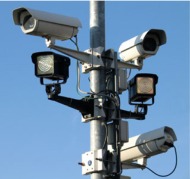Cities Use Anti-Terrorism Funds to Ramp up Citizen Surveillance for other Purposes

With federal funding intended to thwart terrorism, many American cities have expanded surveillance and intelligence gathering that amounts to an assault on people’s privacy, according to critics.
A prime example is Oakland, California, whose crime-plagued streets prompted local officials and police to develop the Domain Awareness Center. Seven million dollars in federal grants meant to prevent terror attacks at the Oakland port will be used by police to collect and analyze volumes of surveillance data from throughout the city. The data can be gathered from a variety of sources, from gunshot-detection sensors to license plate readers mounted on patrol cars.
The Center is planned as a high-tech operation, fully staffed 24 hours a day, which will display its streams of data on banks of giant wall monitors.
Initially data collection will focus on the port, traffic camera coverage, license plate reading and 911 calls. Eventually, the system will add surveillance of schools, state highways and commuter rail.
Oakland’s efforts, which will begin next summer, demonstrate “how cities are compiling and processing large amounts of information, known as big data, for routine law enforcement,” Somini Sengupta wrote for The New York Times. “And the system underscores how technology has enabled the tracking of people in many aspects of life.”
In New York City, the police department—with the help of federal counterterrorism funding—utilizes a computer network linking information from 3,000 surveillance cameras with license plate readers, radiation sensors, criminal databases and terror suspect lists.
Massachusetts’ law enforcement also has used federal money to buy automated license plate scanners, while police in Arlington, Texas, and the sheriffs office in Montgomery County, Texas, bought drones with homeland security money.
Oakland tried to get its own drone too, but gave up on the idea after citizens spoke out in opposition.
The public has demonstrated increasing displeasure with surveillance of their daily activities. The Seattle City Council demanded that the city’s police department return a federally financed drone. Iowa City brought about a moratorium on surveillance equipment, including license plate readers. And Virginia state police were forced by the attorney general to destroy its data base filled with millions of citizens’ license plates, including those photographed at political rallies.
Local leaders say these initiatives are all about stopping crime in their communities. But civil libertarians argue that cities go too far when law-abiding citizens are having their every move monitored by police.
The American Civil Liberties Union of Northern California labeled Oakland’s program “warrantless surveillance” and said “the city would be able to collect and stockpile comprehensive information about Oakland residents who have engaged in no wrongdoing,” according to the Times.
No indication has been given as to what, if any, parameters the Oakland surveillance center will have, or for what period of time citizens’ personal data will be held in its computers.
Speaking to the Times, Oakland City Council member Libby Schaaf, who supports the program, conceded that the operation would be able to “paint a pretty detailed picture of someone’s personal life, someone who may be innocent.”
Steve Spiker, who researches police technology for the city’s non-profit Urban Strategies Council, expressed to the Times a concern that others may share: “What happens when someone doesn’t like me and has access to all that information?”
-Noel Brinkerhoff, Danny Biederman
To Learn More:
Privacy Fears Grow as Cities Increase Surveillance (by Somini Sengupta, New York Times)
How the Surveillance State Threatens the ‘Law-Abiding’ Citizen (by Daniel Amico, FreedomWorks)
Oakland’s Port Surveillance System May Expand to the Entire City (by Ken Broder, AllGov California)
Drones over the Homeland (by Tom Barry, Center for International Policy)
L.A. Police Crank up Surveillance Cameras to Spy on 450,000 Residents (by Ken Broder, AllGov California)
Homeland Security Quietly Runs “Loan-a-Drone” Program for Local Law Enforcement (by Noel Brinkerhoff, AllGov)
Public Buses in Many U.S. Cities Will Soon Be Monitoring Private Conversations for the Government (by Noel Brinkerhoff, AllGov)
- Top Stories
- Unusual News
- Where is the Money Going?
- Controversies
- U.S. and the World
- Appointments and Resignations
- Latest News
- Trump Orders ICE and Border Patrol to Kill More Protestors
- Trump Renames National Football League National Trump League
- Trump to Stop Deportations If…
- Trump Denounces World Series
- What If China Invaded the United States?






Comments